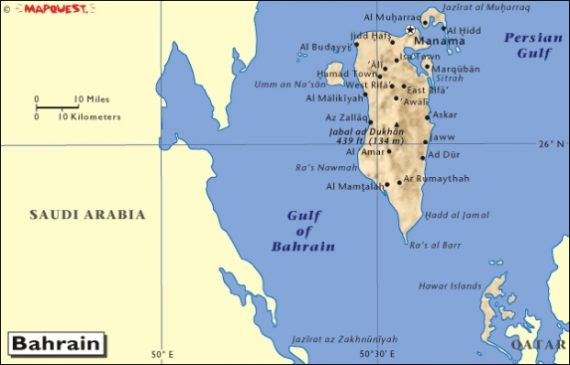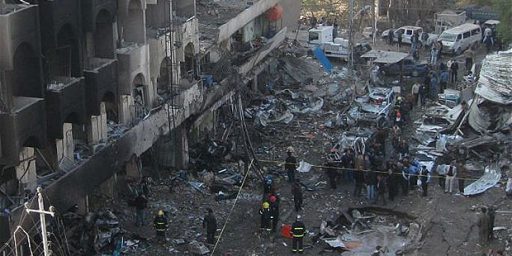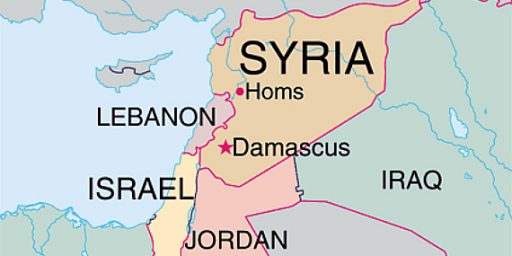Unrest in Bahrain Continues
The unrest continues as those killed during protests are buried. Plus some facts about Bahrain.
 Via the BBC: Bahrain protests: Angry mourners bury clashes victims
Via the BBC: Bahrain protests: Angry mourners bury clashes victims
Thousands of people have been voicing anger against Bahrain’s authorities at the funerals of victims of Thursday’s clashes which left four dead.
Crowds attending Friday prayers joined the funeral processions, calling for the overthrow of the ruling family.
At the prayers a top Shia cleric described the clashes as a “massacre”, saying the government had shut the door to dialogue.
There were also reports of a pro-government rally.
Some quick facts about Bahrain:
- The ruling elites are Sunni, but the majority of the population is Shiite.
- The current king has been on the throne since 1999.
- The country gained its independence in 1971 from the UK.
- The population is less than one million.
- The unemployment rate amongst the young is 19.4%.
- The US Navy’s Fifth Fleet has its HQ in Bahrain.
That last point is interesting because, yet again, the US finds itself having to figure out how to navigate a situation of unrest in a country where the authoritarian government has been a strategic ally and yet is clearly on the wrong side of history.






“The US Navy’s Fifth Fleet has its HQ in Bahrain. ”
Steve, I was thinking about this fact earlier and was wondering: To whom does that give the upper hand to, the US or the present gov’t of Bahrain? To phrase it another way, who needs who more?
Now this does have the potential to turn very ugly. There’s a limit to how far the US can be seen to support massive repression of the majority Shiites and even if the monarchy are able to suppress this in the short term they could well be setting the stage for a period of instability with strikes, terrorist bombings, etc etc. There’s also the possibility that if the monarchy looked like getting overthrown would the Saudi’s intervene? The monarchy have been trying to level the playing field by encouraging immigration of Sunnis and many of them are in the security forces but this is not recipe for prolonged stability. Think Northern Ireland or Iraq. Hard to tell where it’s going.
Analyses of Bahrain so far have been missing what I think to be a very important factor: The Shi’a of Bahrain are not a monolithic group. In fact, there are two schools of Shi’a Islam there (as well as along the Gulf littoral, but that’s another issue). There are the Baharna or Akhbari Shi’a and the ‘Usuli Shi’a. The differences between them are important, though almost always unreported.
The closest simile I can find is that the Akhbari are to the ‘Usuli as Lutherans are to Roman Catholics, at least as of the time of the Reformation. The first has no place for a religious hierarchy while the second depends utterly upon it. The first has a non-judgmental approach to life and politics, figuring that the religious contract is between the individual and God; if you think something is right, then you should do it. You’ll discover the quality of your judgment when you die. The ‘Usuli, on the other hand, depend on layers of intermediaries to tell you what to do in and with your life.
This becomes important because Iran is predominantly ‘Usuli and it plays a nefarious game in Bahrain. Not only do Iranian leaders, from time to time, assert that Bahrain is the “15th Province of Iran”, but they have a long history of supporting groups that seek the violent overthrow of the Al-Khalifa. (1996 Independent article)
Lastly, it is an error to keep identifying Bahrain as an ‘oil state’. Bahrain’s oil has run out. It still has plentiful natural gas, but its oil now comes as a ‘gift’ from Saudi Arabia, which supplements Bahrain’s minuscule production from joint fields with its own oil.
Now, I’m not absolutely current on Bahraini internal politics. My information comes from my three-year tour of duty there in the mid- late-80s. The fundamentals, however, have not changed. Just who or what is energizing protests, I don’t know. But I do see Iran playing a major role.
Still no word from F1 about canceling the first race of the season in Bahrain: http://www.formula1.com/
Al Jazeera English has been reporting new violence by the military against protesters marching on Pearl Square today.